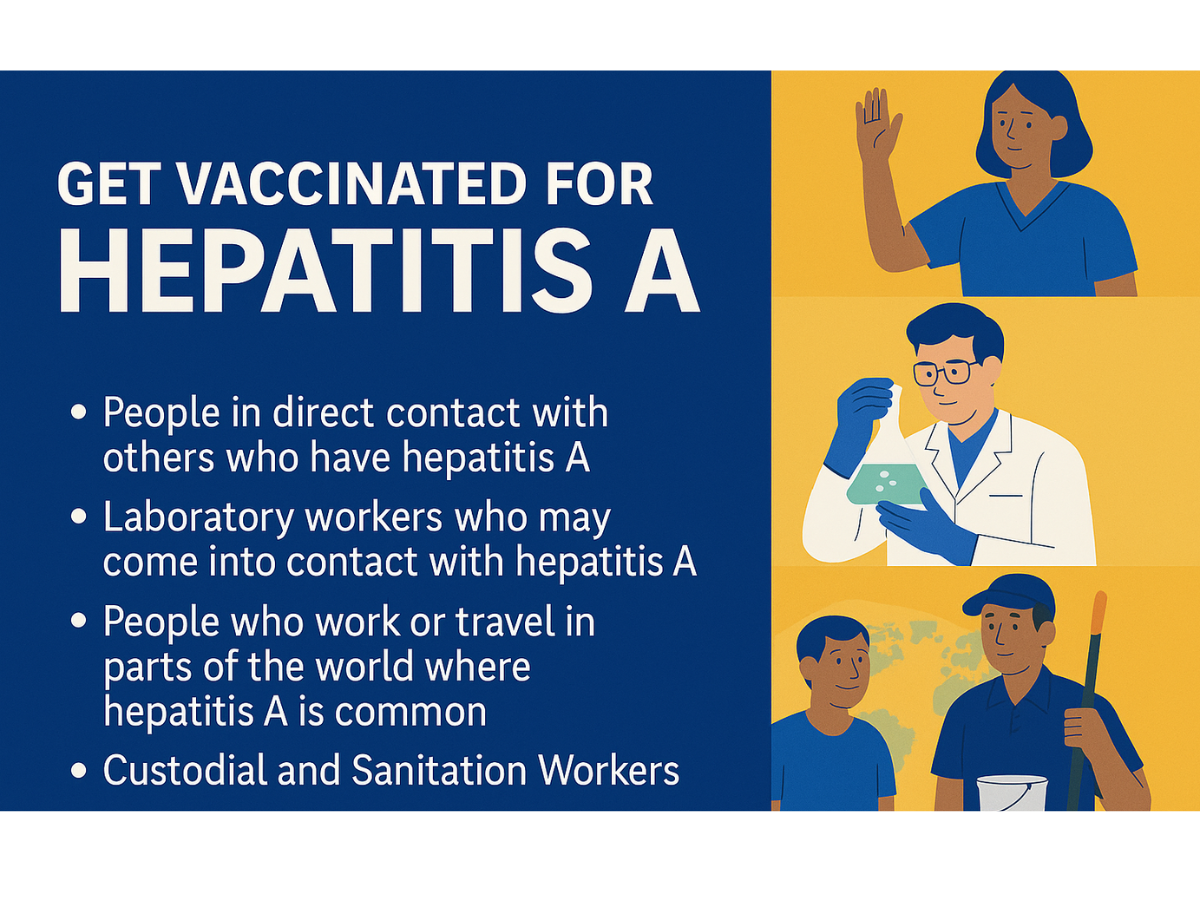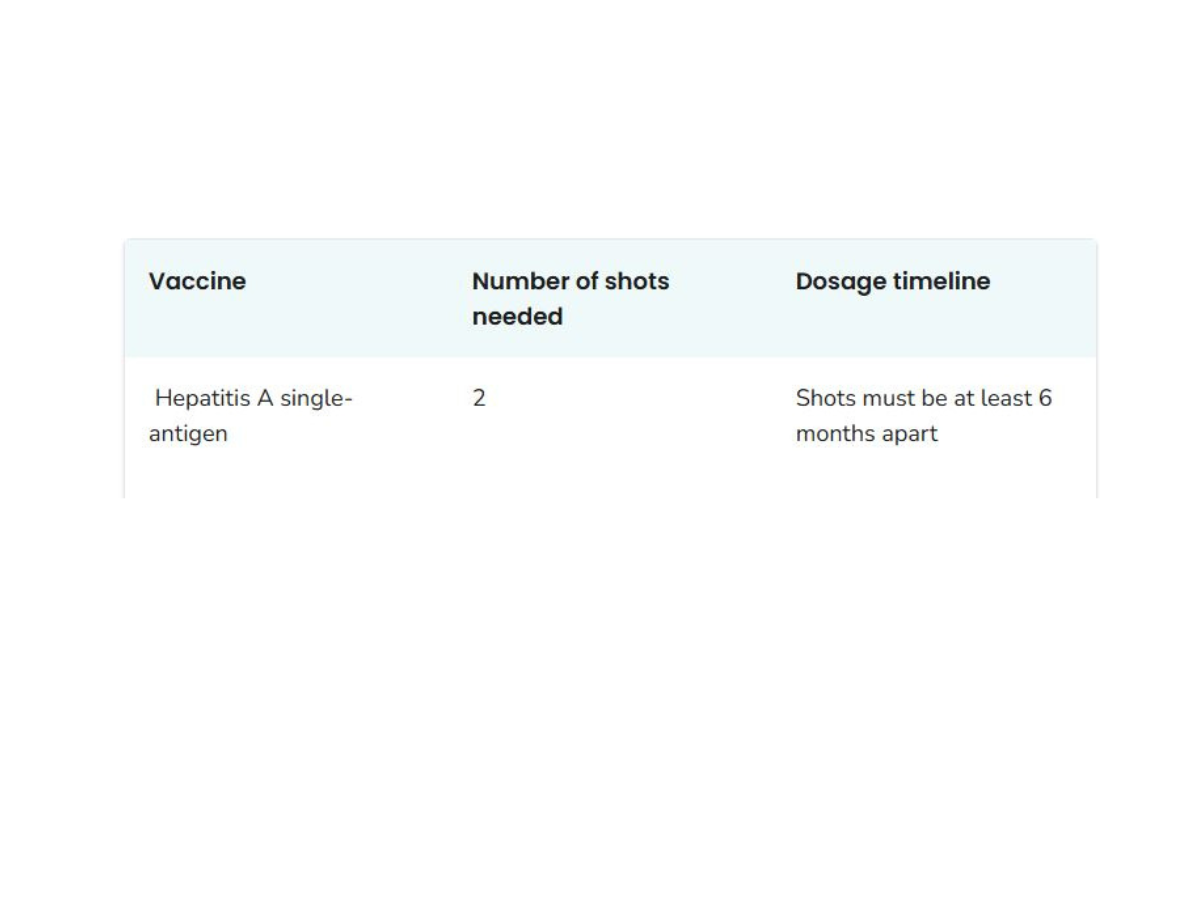What is Hepatitis A?
Hepatitis A is caused by a virus that infects liver cells and causes inflammation. The inflammation can affect how your liver works and cause other symptoms of hepatitis A.
The virus spreads when infected stool, even just tiny amounts, enters the mouth of another person (fecal-oral transmission). You may get hepatitis A when you eat or drink something contaminated with infected stool. You may also get the infection through close contact with a person who has hepatitis A. The virus can live on surfaces for a few months. The virus does not spread through casual contact or by sneezing or coughing.
Here are some of the specific ways the hepatitis A virus can spread:
• Eating food handled by someone with the virus who doesn't thoroughly wash hands after using the toilet.
• Drinking contaminated water.
• Eating food washed in contaminated water.
• Eating raw shellfish from water polluted with sewage.
• Being in close contact with a person who has the virus — even if that person has no symptoms.
• Having sexual contact with someone who has the virus.
What are the Symptoms of Hepatitis A?
Not everyone with hepatitis A has symptoms. Adults are more likely to have symptoms than children. If symptoms develop, they usually appear 2–7 weeks after exposure. Symptoms usually last less than 2 months, although some people can feel sick for as long as 6 months.
Symptoms can include:
• Dark urine or clay-colored stools
• Diarrhea
• Feeling tired
• Fever
• Joint pain
• Loss of appetite
• Nausea, stomach pain, throwing up
• Yellow skin or eyes (jaundice)
Prevention for Hepatitis A
According to the World Health Organization states that :
The spread of hepatitis A can be reduced by:
• Adequate supplies of safe drinking water.
• Proper disposal of sewage within communities.
• Personal hygiene practices such as regular handwashing before meals and after going to the bathroom
What is the Best Way to Prevent Hepatitis A?
To help stop the spread of hepatitis A, it's important to have good personal health (hygiene) habits and avoid any risky behaviors.
Wash your hands often after using the bathroom, changing a diaper, or before making food.
- Wet your hands with clean, running water (cold or warm is fine). Apply soap and rub your hands together.
- Lather the backs of your hands, between your fingers, and under your nails.
Scrub your hands for at least 20 seconds—the length of time it takes to hum the “Happy Birthday” song from beginning to end twice. Rinse thoroughly and dry.
In addition, there are two shots (injections) that can help protect you from hepatitis A:
Immune globulin shot. This shot is a mix of infection-fighting cells or antibodies. You can have the shot before you may be exposed to the virus, such as before you travel. You can also have the shot soon after you have been exposed to the virus.
Hepatitis A vaccine. This vaccine is made from whole, killed hepatitis A virus. It does not have a live virus, so you can’t get hepatitis from it. The vaccine helps to get your body's natural infection-fighting system (immune system) working. After you have the shot, your body makes antibodies that protect you against the virus.
-
Target Audience for Hepatitis A Vaccination at UCR
Health Sciences Students and Staff
- Especially those in clinical rotations, medical, nursing, dental, public health, or EMS programs
- Likely to have direct contact with patients or contaminated materials
Laboratory Personnel
- Individuals working with hepatitis A virus (HAV) or potentially infectious stool samples in research or clinical labs
Custodial and Sanitation Workers
- Those who may be exposed to sewage, human waste, or environments with poor hygiene (e.g., bathroom cleaning in residence halls)
Food Service Workers (Optional but Recommended)
- Especially those working in large dining halls or food prep areas, due to the risk of fecal-oral transmission.
Travelers to Endemic Areas
- UC staff, faculty, or students who study abroad, conduct research, or travel to countries with high or intermediate Hep A prevalence.
Homeless or Unhoused Populations
- Any student, employee, or program participant with unstable housing or limited sanitation access.
- Includes campus police, security personnel, and outreach staff who may have frequent contact with individuals experiencing homelessness or unsanitary living conditions
Workers Handling Nonhuman Primates
- Especially in research animal facilities, since cross-species transmission is possible
Pregnant Women:
- The safety of the hepatitis A vaccine during pregnancy has not been fully established; however, the theoretical risk to either the pregnant woman or the developing fetus is considered low.
- Since hepatitis A can pose a severe risk to pregnant women, those at high risk of exposure during an outbreak and who have not been vaccinated or previously infected should consider vaccination.
- Especially those in clinical rotations, medical, nursing, dental, public health, or EMS programs
-
Hepatitis A Vaccine Schedule
The CDC recommends two doses of the hepatitis A vaccine for Adults who were not previously vaccinated and want to be protected can also receive the vaccine.
-
Need Assistance?
To schedule a Hepatitis A vaccine series or titer test, please contact the Occupational Health Coordinator by emailing ehsocchealth@ucr.edu or calling (951) 827-5528.
- Resources For Hepatitis A


